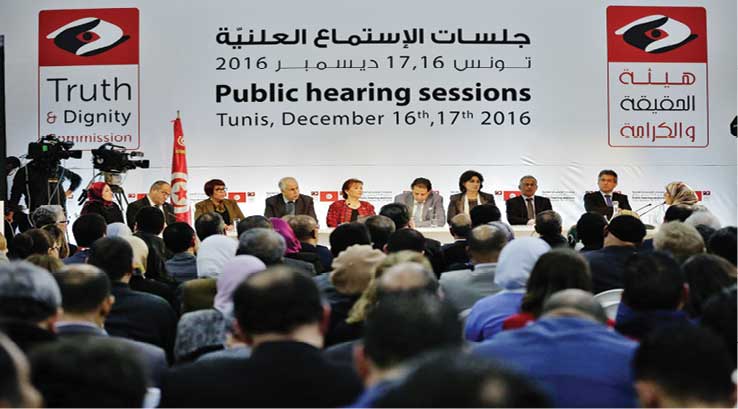

TUNISIA
 Our Concerns
Our Concerns
- Violations of procedural guarantees and of fundamental rights under the pretext of the fight against terrorism;
- Undue restrictions on the right to freedom of peaceful assembly and association under the state of emergency;
- Persistent practice of torture and other cruel, inhumane or degrading treatment or punishment in detention;
- Executive interference in judicial processes and impunity of State security agents for past and recent abuses.
 Recommendations
Recommendations
- Amend the Anti-terrorism Law No. 22/2015 and ensure its compliance with international human rights standards;
- Ensure respect for the principles of proportionality and necessity in the renewal of the state of emergency and in the implementation of derogatory measures as well as ensure they are not discriminatory;
- Ensure the independence of the judiciary by protecting it from any executive interference;
- Provide the Truth and Dignity Commission with appropriate means and time to document violations committed under the former regime and prosecute those responsible for past human rights violations;
- Carry out an effective security sector reform and put an end to the impunity of State agents.
 Upcoming
Upcoming
- 18 March 2017: Submission of Tunisia’s follow-up report to the Committee on Enforced Disappearances;
- 31 March 2017: Five-year delay in the submission of Tunisia’s sixth periodic report to the Human Rights Committee;
- 2 May 2017: Third Universal Periodic Review of Tunisia before the Human Rights Council;
- 13 May 2017: Submission of Tunisia’s follow-up report to the Committee against Torture.
Tunisia has been experiencing a transition period since 2012. The transitional justice process, however, failed to include any security sector reform, while the judiciary continues to experience interference from the executive branch. As a result of these shortcomings, Tunisia has seen the resurgence of past practices such as arbitrary detention, torture, and police violence, especially under the pretext of the fight against terrorism.
In October 2016, President Beji Caid Essebsi once again extended the state of emergency, which came into force on 24 November 2015 and has been prolonged several times since, for a further three-month period. As a result, the Ministry of Interior is still able to restrict the right to free movement, to suspend all strikes and demonstrations, to prohibit and disperse all peaceful gatherings that it considers a threat to public order, and to pronounce the arrest of any person whose activity is considered dangerous to public security and order.
That same month, the new Tunisian government took office under the lead of the new Prime Minister Youssef Chahed, member of the Nidaa Tounes Party, which won the legislative and presidential elections in late 2014.
On 17 November 2016, the Truth and Dignity Commission, established in 2014 to investigate human rights violations in the country since 1955, held its first public hearings in Tunis. For the first time since the revolution, victims of the dictatorship publicly shared their testimonies. Following these hearings, former President Zine El Abidine Ben Ali acknowledged in a public statement that “errors, abuses and violations” had been committed during his presidency.

Human rights violations committed in the fight against terrorism
After terrorist attacks shook the country in 2015, additional measures were taken to counter terrorism, which further restricted fundamental rights and freedoms. While the government announced the arrest of several thousands of “suspects” in 2015, this year, hundreds of individuals were put under house arrest, while travel bans were imposed on more than 15,000 individuals considered as “potential terrorists”. Violent police interventions and night raids have become more prevalent; over the span of a few months, entire neighbourhoods were sealed off, mass searches were conducted arbitrarily, without due process, and there was regular resort to excessive force.
Despite numerous reports of systematic abuses committed by the security forces, as well as the lack of independent and impartial investigations or accountability, on 24 July 2015, the Assembly of People’s Representatives – the Tunisian Parliament – passed a new Anti-Terrorism Law giving more power to law enforcement agents. In addition to the broad and imprecise definition of terrorism, which opens the way for abusive arrests, the duration of police custody without a charge can now be extended up to 15 days, while international standards limit it to 48 hours. Under the 2015 Law, suspects are not granted access to a lawyer for the whole custody period, which has resulted in a systematic practice of incommunicado and secret detention of terrorist suspects.
In June 2016, the Criminal Procedure Code was revised, introducing the right of individuals suspected of terrorism to have access to a lawyer while in custody, despite maintaining its lengthy period of 15 days. Moreover, this right remains limited as they are only allowed to meet their lawyer after 48 hours of police custody and for a maximum of 30 minutes. In practice, the use of incommunicado detention and torture of terrorist suspects to extract confession continues and coerced self-incriminating statements are routinely admitted and relied upon in trial. Despite the numerous allegations of torture raised by victims before domestic courts, not a single decision to annul coerced confessions has been reported to date, thus leaving numerous individuals arbitrarily detained following unfair trials.

The fragility of human rights protection and the rule of law in the post-revolutionary context
The political, economic, and security challenges that Tunisia has been experiencing since the revolution are affecting the general situation of human rights and the rule of law. This observation forms the core of the report submitted to the Human Rights Council by Alkarama in September 2016. As such, it analyses the situation of human rights in Tunisia and makes 16 recommendations to the authorities, in anticipation of its Universal Periodic Review in May 2017.
In its report, Alkarama raised the abovementioned issues posed by the country’s security and counterterrorism policy, all the more pressing since the state of emergency is being extended in total disregard of the principles of necessity and proportionality. The prolongation of the state of emergency for the past two years is adversely affecting fundamental rights, most notably the right to peaceful assembly and association. The authorities regularly invoke the state of emergency decree to justify the prohibition of peaceful gatherings; the excessive use of force by the police to disperse demonstrations is no longer a thing of the past.
In this context, Alkarama also highlighted a worrisome resurgence of executive interference in judicial processes, which constitutes a recurring obstacle to the investigation and prosecution of State agents, against whom victims have made allegations of torture or other abuses. It is all the more concerning that the reform of the custody system implemented in June 2016 failed to ensure that the fundamental rights of detainees are effectively respected by security forces. If on the one hand the new Criminal Procedure Code limits the duration of police custody to 48 hours in criminal cases and allows detainees to have access to a lawyer from the onset of their arrest, on the other hand, medical examinations are not automatically carried out to prevent abuses and the right to challenge one’s detention is still not guaranteed.
Lastly, Alkarama stressed that the impunity of security forces remains a crucial issue for both past and present abuses. In this regard, it underlined the lack of resources and time granted to the Truth and Dignity Commission, preventing it from delivering any truth telling or ensuring comprehensive documentation of abuses. To date, none of the cases of serious violations committed by the former regime has been transferred to the specialised courts created to take appropriate legal action. Alkarama shared its fear that this lack of investigation and accountability, coupled with the lack of a genuine security sector reform, has fostered a climate of impunity and facilitated the return and recurrence of past practices.

TUNISIA REVIEWED BY UN TREATY BODIES FOR THE FIRST TIME SINCE THE REVOLUTION
In 2016, Tunisia was reviewed by two Treaty Bodies: the Committee on Enforced Disappearances (CED) for the first time in its history, and the Committee against Torture (CAT) for the first time since the revolution. The two bodies raised different but crosscutting concerns and highlighted the need to address past violations through investigations and prosecutions, as well as the need to take measures to avoid their repetition.
On 7 and 8 March 2016, the CED reviewed Tunisia’s initial report to the Committee and echoed the concerns expressed by Alkarama in its shadow report. The experts called on the authorities to fully investigate cases of enforced disappearances that occurred before the revolution and to prosecute those responsible. As a guarantee of non-repetition, the Tunisian authorities were invited to review their legislation in order to separately criminalise the crime of enforced disappearance and to ensure that all individuals arrested are allowed to contact their families and lawyers from the onset of the arrest, including in counterterrorism cases. Indeed, while State representatives posited that there had been no cases of enforced disappearance since the revolution, the CED members recalled, based on information submitted by Alkarama, that the practice of secret detention even for short periods of time amounts to a crime of this nature.
On 9 June 2016, the CAT issued its Concluding Observations following the review of Tunisia, to which Alkarama contributed by submitting a shadow report and by sharing its key concerns with the experts during a private briefing with NGOs prior to the review.
The Committee expressed concern over the lack of investigation into allegations of torture and over the interference of the executive in such cases, jeopardising the independence necessary to prosecute law enforcement agents. It also expressed concern over acts of reprisals faced by victims and their families who reported cases of torture and ill-treatment.
While the UN experts welcomed the reform of the Code of Criminal Procedure, they expressed serious concern over the fact that suspects cannot challenge the lawfulness of their detention. They also called on the authorities to ensure that arrested individuals are listed in an accessible common registry from the onset of the arrest and, in order to avoid unacknowledged detentions, that such a registry must automatically include key information such as the exact moment of the arrest and the place of detention.
While recognising the difficulties faced by Tunisia in the current security context, the UN experts recommended that the State amend its Anti-Terrorism Law and strictly define acts of terrorism, reduce the duration of authorised police custody without charge, and eliminate all forms of incommunicado detention.